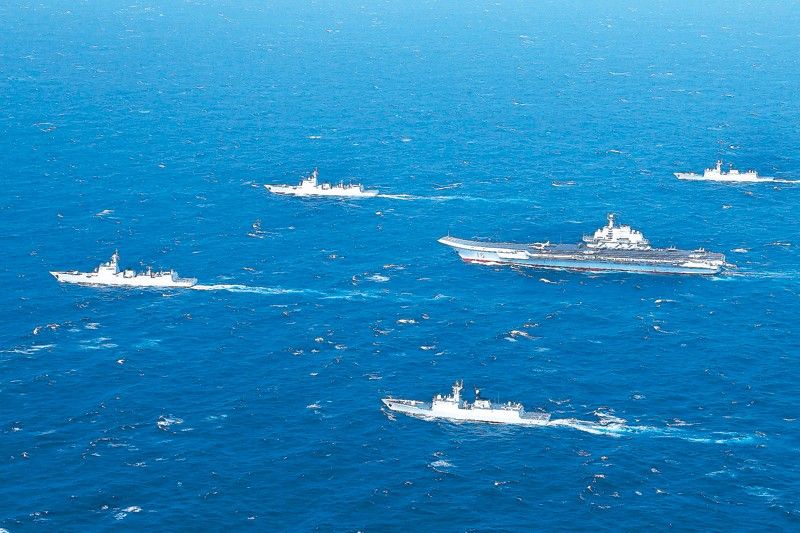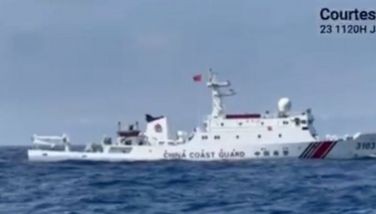US won’t tolerate Chinese ‘maritime empire’

MANILA, Philippines — The United States says it will no longer tolerate China’s actions aimed at building a “maritime empire” in the South China Sea.
It also condemned as “unlawful” Beijing’s “bullying” and “intimidation” of its smaller neighbors to control resources in disputed waters.
US Secretary of State Michael Pompeo made the statement on the fourth anniversary on Sunday of the issuance by an international tribunal of a ruling invalidating Beijing’s expansive claim in the South China Sea and reaffirming the Philippines’ maritime entitlements.
“The world will not allow Beijing to treat the South China Sea as its maritime empire. America stands with our Southeast Asian allies and partners in protecting their sovereign rights to offshore resources, consistent with their rights and obligations under international law,”
Pompeo said in a statement.
“We stand with the international community in defense of freedom of the seas and respect for sovereignty and reject any push to impose ‘might makes right’ in the South China Sea or the wider region,” he said.
China calls the US accusation completely unjustified.
Pompeo pointed out that Beijing uses intimidation to undermine the sovereign rights of Southeast Asian coastal states, bully them out of offshore resources, assert unilateral dominion and replace international law with “might makes right.”
In 2010, then Chinese foreign minister Yang Jiechi told his ASEAN counterparts that “China is a big country and other countries are small countries and that is just a fact.”
Pompeo said China’s “predatory world view has no place in the 21st century.” He emphasized that China has no legal grounds to unilaterally impose its will on the region.
Beijing’s basis for claiming almost the entire South China Sea is its so-called “nine-dash line,” formally announced in 2009.
In a landmark ruling on July 12, 2016, the Permanent Court of Arbitration (PCA) based in The Hague found no legal basis for China to claim historic rights to the South China Sea. The tribunal also ruled that Beijing had breached the sovereign rights of the Philippines, which brought the case. Beijing vowed not to honor the ruling.
“The Tribunal sided squarely with the Philippines, which brought the arbitration case, on almost all claims,” Pompeo said.
He stressed the Arbitral Tribunal’s decision is final and legally binding to both parties.
“Today we are aligning the US position on the PRC’s maritime claims in the SCS with the Tribunal’s decision,” he added. PRC stands for People’s Republic of China.
According to Pompeo, China cannot lawfully assert a maritime claim, including any Exclusive Economic Zone (EEZ) claims derived from Panatag (Scarborough) Reef and the Spratly Islands – vis-a-vis the Philippines in areas that the Tribunal found to be in the Philippines’ EEZ or on its continental shelf.
“Beijing’s harassment of Philippine fisheries and offshore energy development within those areas is unlawful, as are any unilateral PRC actions to exploit those resources,” Pompeo said, referring to islets, reefs and other land features in the West Philippine Sea being claimed by China.
“In line with the Tribunal’s legally binding decision, the PRC has no lawful territorial or maritime claim to Mischief (Panganiban) Reef or Second Thomas (Ayungin) Shoal, both of which fall fully under the Philippines’ sovereign rights and jurisdiction, nor does Beijing have any territorial or maritime claims generated from these features,” he said.
He also said Beijing has no lawful, coherent maritime claim over areas within the territorial waters of other countries in the region like Vietnam, Malaysia, Indonesia and Brunei.
“As such, the United States rejects any PRC maritime claim in the waters surrounding Vanguard Bank (off Vietnam), Luconia Shoals (off Malaysia), waters in Brunei’s EEZ and Natuna Besar (off Indonesia),” Pompeo said. “Any PRC action to harass other states’ fishing or hydrocarbon development in these waters – or to carry out such activities unilaterally – is unlawful.”
Pompeo also noted that China has no lawful territorial or maritime claim over James Shoal, an entirely submerged feature only 50 nautical miles from Malaysia and some 1,000 nautical miles from China’s coast. James Shoal is often cited in China’s propaganda as the “southernmost territory of China.”
“International law is clear: An underwater feature like James Shoal cannot be claimed by any state and is incapable of generating maritime zones. James Shoal (roughly 20 meters below the surface) is not and never was PRC territory, nor can Beijing assert any lawful maritime rights from it,” Pompeo stressed.
Responding to Pompeo’s statement, China said the US “deliberately distorts the facts and international law,” including the United Nations Convention on the Law of the Sea (UNCLOS).
“The United States is not a country directly involved in the disputes. However, it has kept interfering in the issue. Under the pretext of preserving stability, it is flexing muscles, stirring up tension and inciting confrontation in the region,” the Chinese embassy in Washington said in a statement.
“We advise the US side to earnestly honor its commitment of not taking sides on the issue of territorial sovereignty, respect regional countries’ efforts for a peaceful and stable South China Sea and stop its attempts to disrupt and sabotage regional peace and stability,” the embassy said.
- Latest
- Trending
































